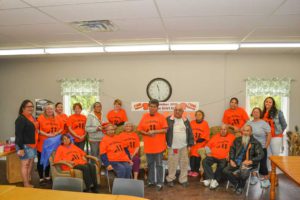MANITOULIN—A sea of orange shirts rose across the nation last week, including Manitoulin Island, as communities and schools recognized Orange Shirt Day. People wore orange shirts as a symbol of the many losses experienced by those who were caught up in Canada’s infamous residential school system. The day also served as a poignant launch for the ‘Every Child Matters’ program at Noojmowin Teg Health Centre and a logo design contest with some great prizes.
Orange Shirt Day is based on the story of Phyllis (Jack) Webstad of Dog Creek, British Columbia, a Stswecem’c Xgat’tem First Nation elder and her first day at residential school in 1973.
“I went to Mission (a residential school in British Columbia) for one year,” she said. “I had just turned six-years-old. We never had much money, and there was no welfare, but somehow my granny managed to buy me a new outfit to go to the Mission school in. I remember going to the Robinson’s store and picking out a shiny orange shirt. It had eyelets and lace and I felt so pretty in that shirt and excited to be going to school.”
Her delight was not to last long.

photo by Robin Burridge
“Of course when I got to the Mission, they stripped me and took away my clothes, including the orange shirt,” she said. “I never saw it again, except on other kids. I didn’t understand why they wouldn’t give it back to me. It was mine.”
Since that time, Ms. Webstad said that the colour orange has always reminded her of that incident and “how no one cared and how I felt like I was worth nothing.”
“Phyllis’ orange shirt is a symbol of so many losses experienced by those who were sent to residential schools over many generations,” said Mary Pheasant, health resolution support worker at Noojmowin Teg Health Centre, who was organizing Orange Shirt Day activities across Manitoulin. “Losses of family, culture, language, parenting, self-esteem and worth were experienced by everyone.”
“I finally get it, that feeling of worthlessness and insignificance, ingrained in me from my first day at Mission affected the way I lived my life for many years,” said Ms. Webstad. “Even now, when I know nothing could be further from the truth, I still sometimes feel that I don’t matter. Even with all the work I have done.”
“The impact of residential schools goes beyond those who experienced the impact first hand,” noted Ms. Pheasant. “We are feeling the impact in the generations of children who have grown up in families where the parents had been taken from their families and placed in the residential schools.”

photo by Michael Erskine
Although Orange Shirt Day is officially observed on September 30, it was celebrated at local schools a day early on September 29 as the Friday was a professional development day at the Rainbow District School Board.
Ms. Pheasant has instituted a logo contest based on the theme “respect, remembrance and reconciliation.”
“The winning artwork will be printed on t-shirts,” explained Ms. Pheasant. The poster size should be on at least 8.5 by 11-inch white paper, should only use pencil, crayon or paint, have the name, age, grade and school listed on the back along with the student’s shirt size. “Please don’t include the words ‘every child matters,’ as those words will already be printed on the shirts,” she said, adding that only original artwork will be considered (so no cut and paste from the Internet kids).

recognition of the many losses experienced by those who attended residential schools.
Prizes for the contest will be $100 for first, $50 for second and $25 for third place.
Entries to the contest are due by 3 pm Friday, December 2, 2016 at the Noojmowin Teg Health Services offices on Highway 540 in Aundeck Omni Kaning or mailed to 48 Hillside Road, Aundeck Omni Kaning, Little Current, ON, P0P 1K0.





